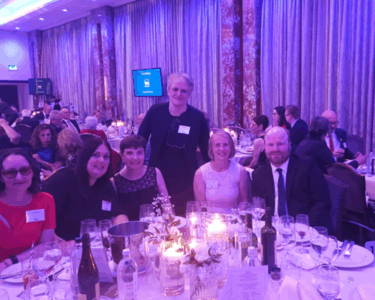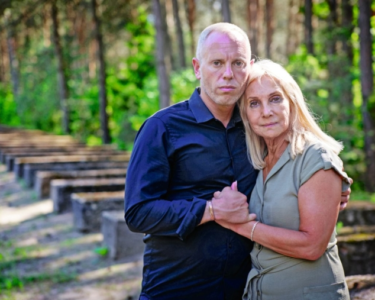Marking World Autism Awareness Day – how can we ensure quality provision for, and experience of, Holocaust T&L is a right and accessible for all young people?
Reflections by Centre’s Corey Soper and Beacon School alumni
As today is World Autism Awareness Day, we wanted to celebrate the distinctive ways of thinking of Autistic pupils, and to offer some advice for best practice when working with your Autistic pupils and teaching about the Holocaust. As a Centre, we’re delighted to have worked with a number of alternative provision or specialist schools which specialise in working with autistic pupils as part of our Beacon School programme, such as Venturers Academy, Sketchley Hall, Demeter and St Martin’s among others, who have shown a passionate commitment to ensuring high-quality research-informed Holocaust education is inclusive and accessible to all pupils. Each of these schools has created excellent practice for exploring complex histories in a way that is inclusive of neurodivergence, developing resources, pedagogical approaches and classroom spaces where Autistic people can learn well. With 166,000 pupils diagnosed with Autism in the UK, around 1 in 100 students, almost all teachers in comprehensive schools will also be teachers of autistic learners, so its vitally important we accommodate and celebrate neurodivergence in our teaching work, especially when teaching subjects like the Holocaust, to ensure provision and experience in inclusive, accessible, rich and challenging for all learners.
As Autism is a spectrum condition, the presence of autistic characteristics can be very diverse within the autistic community and can present in quite different ways. As all learners have diverse and individual traits and characteristics, so autistic learners also have very different traits and therefore have very diverse needs in the classroom environment. As a result, the kinds of support needed for autistic learners will vary dramatically. Autistic pupils can have many diverse strengths when it comes to learning about the Holocaust. Some Autistic pupils may experience injustice sensitivity, where they are particularly strongly affected when confronted with situations that feel unfair or cruel – which can lead to a high degree of engagement with studying subjects like the Holocaust. Other Autistic pupils may have a strongly detail-orientated thinking style, enabling them to ask highly probing and fact-focussed questions about this history, which can lead to rich conversations and develop deep subject knowledge. Some Autistic pupils are excellent analytical and logical thinkers, which can be powerful when exploring complex histories of cause-and-effect, or the scale and geography of the Holocaust. Often, when Autistic pupils are highly engaged, they can focus for long periods of time and think very deeply about the subjects of lessons.
We’ve reached out to a few of our Beacon School teachers who are experts at working with Autistic pupils, in specialist and mainstream setting, to get their reflections and advice on excellent practice for teaching about the Holocaust with Autistic pupils, in a way that draws on their strengths and supports them.
Trystan Williams, Deputy Chief Executive Officer of the Venturers Trust, including Venturers’ Academy (an alumni UCL Beacon School) offered these thoughts:
“Before I move into the detail and how I think our staff can help our children understand the Holocaust, what I do bring to the table is some understanding of how children develop, and what parents / staff members and others can do to support children’s coping, resilience, how to be a ‘global citizen’ and have the capacity to contribute productively, over time, to a healthier society where this kind of atrocity never happens again.
“The Holocaust becomes relevant in different ways and at different times in different families. For some, the trigger for talking about the Holocaust may be a story a child has overheard at school or on the playground or something they may have picked up through social media. Sometimes there is something in the news—as with Gaza/Israel recently — that worries our young people and reminds parents and staff at the school of the necessity for a culture of vigilance.
“Knowing about the Holocaust for any child from any background and need is necessary (linked to the PSHE Curriculum and all strands of SMSC) because it:
- Teaches the importance of tolerance, respect, and inclusion- respect for each person, regardless of disability, race, religion, age, wealth, or anything else that might separate us from each other.
- Illustrates the dangers of hate speech.It helps children learn about the discriminatory power of hate speech, the ways that playing on people’s fears leads, slowly but surely, to people acting—sometimes with prejudice sometimes with violence—on those fears.
- Informs accurately. Our children will hear about it anyway, and it is best they learn about it in an environment where the facts are presented knowledgeably, addressing and preventing fears, lowering anxiety (absolutely necessary for our children with ASC) and misconceptions.
- Supports resilience.It may seem counterintuitive, but children are less anxious when they know more about the hazards of the world around them, again a crucial element when support and educating children with autism in a specialist setting. Children worry when they hear about scary events that are beyond their control, and they worry even more when they feel the adults in their lives are keeping secrets from them. Authentic trust and relationships have been developed through our Holocaust education programme at Venturers’ Academy.
- Learning about the history of the Holocaust—how it started, how it developed, how it grew—is the best possible prevention of another one. It is the best insurance that our children will grow into adults who are vigilant to the dangers of creeping anti-Semitism, as well as other forms of racism, sexism, and intolerance of others. I don’t think it is an overstatement to say that this may (alongside global warming) be the single most important lesson our children need to learn, for the survival of the planet.
“I am very happy that educators are beginning to recognise the importance of Holocaust education within Special Schools and ALP.
“No matter the children’s age, it’s crucial to educate in an age-appropriate way, making reasonable adjustments that are aligned to their EHCPs.
“Staff at Venturers’ Academy are encouraged to:
- Take stock of their own emotions before talking about the Holocaust with a child. The child needs staff to be calm and confident, to reassure them that they will keep them safe.
- Be honest and positive.Affirm the hard reality; don’t sugar-coat the truth, either. This helps them feel more secure in a dangerous world if they feel they can trust the staff to tell them the truth.
- Listen deeply, and reassure as our children may not be able to articulate the questions they’re worrying about. “Why did the Holocaust happen?” for example – “we have laws against it, and we have police officers and judges and others who are working to keep us safe.”
- Emphasise tolerance.The beginning stage of Holocaust education is about tolerance, thinking about bullying and inclusion in our children’s world, their classroom, and community.
- Address issues of peer pressure- showing our children why it`s important to speak out against injustices they encounter in their daily lives, teaching our children to say no to bullies.
- Be creative. Help our children find avenues of creative expression, whether musical, visual, linguistic, or some other medium.
- Love is stronger than hate – help our children move toward constructive actions that fight every kind of bullying, bigotry, and prejudice, including antisemitism.
- Have faith in our children’s resilience. Yes, it is a dangerous world, and there are reasons for fear. We use the lessons of the past to help our children feel empowered by helping to create a world that is safer and kinder.
- Model tolerance, respect, and civic engagement.
“By providing a safe environment, and being calm and attentive, staff can alleviate the fear, dismay, or confusion children often experience during chaotic times, as well as helping them develop coping skills that will serve them well going forward.
In a mainstream context, Nottingham University Samworth Academy (NUSA), Quality Mark Beacon school Lead Teacher Dominic Townsend offered these reflections:
“Never underestimate the historical classroom bonds you can form with an ASD pupil or pupil with Aspergers. I remember fondly a former pupil who had a love for History despite the challenges he faced in other subjects. He would seek me out to ask about history and in particular the Holocaust and we often found ourselves communicating in German which he was self-learning and I felt the need to rise up to the challenge and converse back whenever we crossed paths. He loved facts and could recall plenty of them, so I always ensured the facts led to discussions and explored whatever elements of history he had read about in his own free time. For me this is the epitome of enrichment as it empowered him to explore his love of history in so many ways. It is important to remember that neurodiverse pupils can have incredible memories, often far greater than our own when it comes to subjects like history, therefore we should always empower them to explore their knowledge and passions in life. Knowledge is 50% of history, we as teachers have the powerful knowledge to teach our pupils how to think like a historian and to be the enablers who equip them with the skills to succeed in our subjects and life. A label or diagnosis should never be a barrier or hurdle to success, everyone has the talent to succeed in their very own way.



